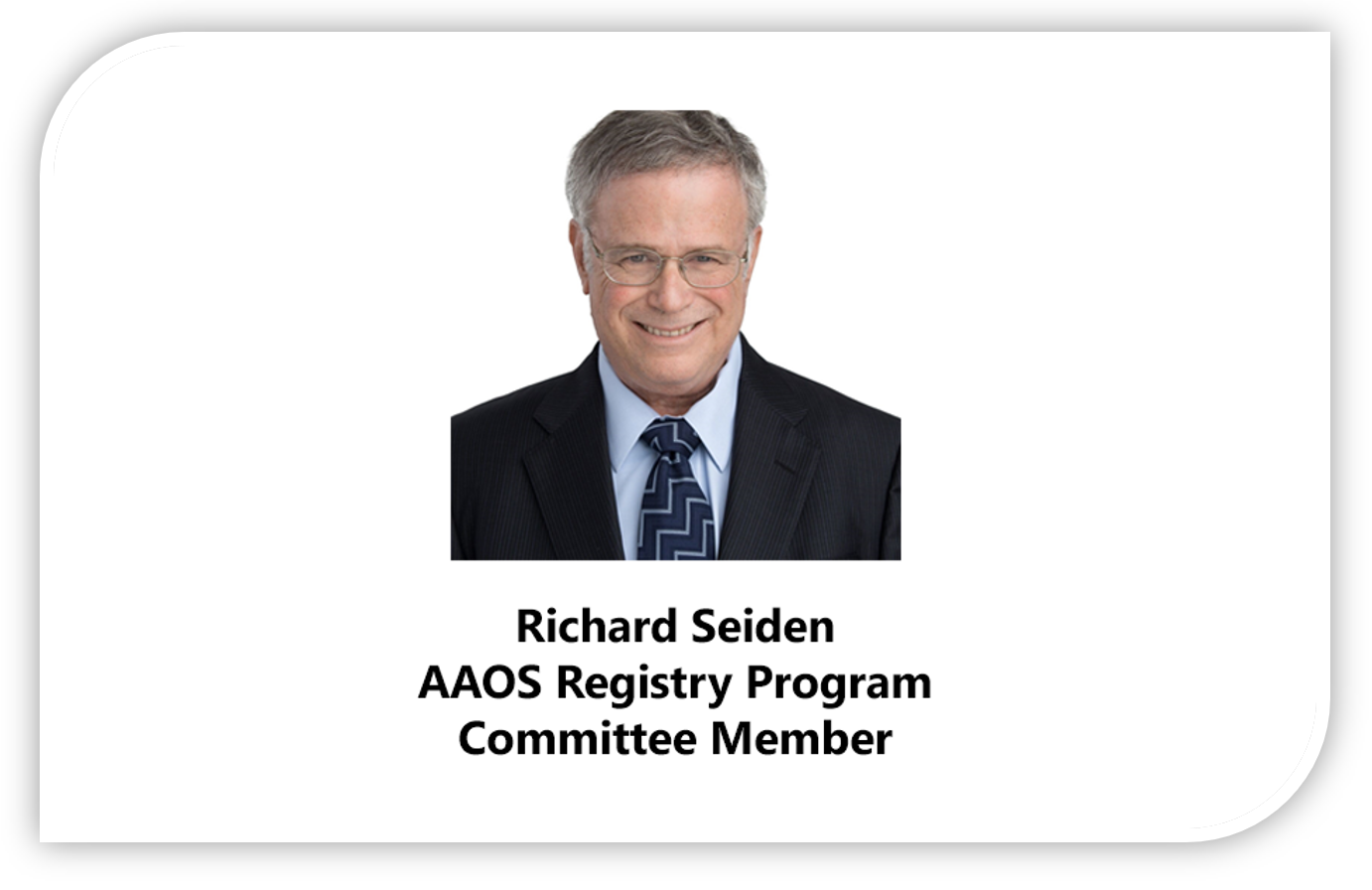
Guest Blogger: American Academy of Orthopaedic Surgeons (AAOS) Registry Program Committee Member Richard Seiden
Richard Seiden is the AAOS Registry Program Public Advisory Board (PAB) Chair and the PAB Representative on the American Joint Replacement Registry (AJRR) and Shoulder & Elbow Registry (SER) Steering Committees. In this blog, he shares his personal experience as a joint replacement surgery patient (he’s had hip replacements, knee replacements, and shoulder replacements). Mr. Seiden offers patients helpful advice to better prepare for dealing with post-surgery needs. He indicated that he hopes sharing his experience will be helpful to other patients, but his advice is not a substitute for consulting with your physician.
As an arthritis patient who has had multiple joint replacement surgeries, I try to turn my experiences with a disease or a treatment into “lessons learned” from which others can benefit. In particular, I like to think that my own outcomes from joint replacement surgeries can be the basis for further education for other patients, physicians or surgeons, and others in the health care delivery system. I believe that each patient’s “lived experience” through surgery and recovery should be added to a collection of data and knowledge of similar procedures.
Although these may not be the only ways to accomplish the “lessons learned” objective, there are two principal ways in which patients can make a contribution to “libraries” of patient experiences, through (1) Registries, and (b) Patient-Reported Outcomes or “PROs.”
Registries
Registries are created when providers agree to submit their information about procedures and treatments provided to patients. In order to ensure patient privacy, all information gathered by registries is presented in reports that are aggregate and de-identified. Every element of the health care delivery system for joint replacement surgery – patients, individual providers, hospitals/ambulatory surgery centers (ASCs), device manufacturers, and insurers, is vitally interested in better patient outcomes and continuous quality improvement. Better patient outcomes mean: (a) Enhanced joint performance following surgery, (b) Larger range of motion and flexibility, (c) Less pain, (d) Fewer repeat or revision surgeries on the same joint, (e) Reduced side effects, and (e) Higher patient satisfaction.
The value of a registry is significantly enhanced as it collects data over time, creating long-term (also known as longitudinal) studies. The larger the number of studies, the more reliable the analyses can be with regard to that data.
Patients should encourage their physicians and hospital or ASC providers to participate in registries, especially the American Joint Replacement Registry (AJRR). AJRR has been gathering information since 2012 from hospitals and ASCs, with respect to total knee replacement and total hip replacement surgeries. In fact, as of June 2020, the AJRR has collected procedure information with respect to over 2,000,000 cases. Given the success of the hip and knee registry, the American Academy of Orthopedic Surgeons (AAOS) has expanded to include a Shoulder & Elbow Registry, a Musculoskeletal Tumor Registry, and the American Spine Registry, a collaborative registry with the American Association of Neurological Surgeons - with more registries to come to ultimately represent the entire orthopaedic specialty.
Patient-reported Outcomes
PROs are created by patients filling out surveys or questionnaires about their experience with a procedure, highlighting their patient satisfaction, but also their experience of both intended and unintended consequences from a medication or treatment. Although some of the outcomes can be accurately and objectively measured by a clinician (physician or other provider), such as blood pressure, infections, range of motion (for replaced joints), a number of other outcomes are more subjective and not so easily measured other than through oral or written reports by the patient – for example, pain, fatigue, depression, and overall well-being.
If we do not record these outcomes and reactions to procedures, we will never have the basis for analyzing these outcomes. As you can imagine, patient participation in completing these surveys is essential for future study, and the development of enhanced pre-surgical protocols, surgical techniques, device manufacture, and post-surgical protocols and practices.
From my perspective, there are two motivations for patients to volunteer to take PRO surveys, one for their future use if they should have to undergo a similar procedure, and one for other patients, and their providers, device manufacturers, and even insurers. The future of improving health care lies in the hands of current and former patients who participate in PRO surveys, where patient input is critical to better inform the health care delivery system.
How to Ensure Optimal Results After Your Surgery
- It is vitally important to find a physician/surgeon who you respect with confidence in their advice and their skills as a surgeon.
- Your greatest success as a patient will come from close adherence to the post-surgery care plan prescribed by your surgeon, and then implemented with the assistance of your physical therapist. Keep up the exercises on days when you do not see the therapist, and well beyond your last session of physical therapy.
- It is important to view each obstacle that you encounter as a hurdle and not a barrier. You should be able to get over the hurdle, or to go around it.
- Successful recovery will require persistence and patience, and occasional "powering through the pain."
- Sometimes it is important to make things look better than others can imagine or that they appear. For example, my physical therapist has advised me to walk more normally, even though it may be a bit of a strain or cause minor pain at the replaced joint site.
- Unless absolutely necessary, try not to use your disease or surgery/recovery as an excuse for not living your life and challenging yourself.
- During your recovery and rehabilitation period, try to maintain a positive and even optimistic outlook. Once the surgery has been completed, and the post-surgical therapy has concluded, you should have enhanced range of motion and the ability to return to work, if applicable, and to most of your favorite physical activities before the surgery.
- Aim to thrive not just survive!
For more information on registries from the patient perspective, visit OrthoInfo.com, AAOS' patient-facing website.
Be sure to leave a comment in the form below!


